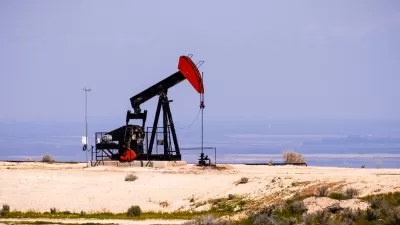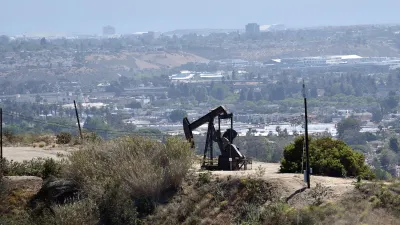With the devastating spill of oil in the Gulf, this post from The National Review suggests taking control over off-shore drilling out of the hands of government and putting it into the hands of private interests.
Iain Murray of the Competitive Enterprise Institute says private interests would be able to do more to protect the oceans from similar spills -- and even do better at preventing them.
"We need to move away from the crony corporatism that has characterized much of the nation's energy sector during the last century or so. It would be foolish to promise that market-based reforms would prevent another disaster, but they would be more effective than yet more meaningless bureaucracy. There are several reasons for this.
First, the existing government regulations have been counterproductive. They pushed energy companies offshore - miles and miles offshore. America is a resource-rich country, and unlike other resource-rich countries, we have locked up most of our resources so we can't use them. While the Gulf of Mexico holds about 44 billion barrels of oil in undiscovered reserves, according to Minerals Management Service (MMS) estimates, the continental U.S. has slightly more onshore. The difference is that we are allowed to explore and extract the offshore reserves, while it is extremely difficult to get permission to do the same on land. As a result, most exploration takes place offshore, where the consequences of a spill are so much greater."
Thanks to Grist
FULL STORY: Tapping the Well of Freedom

Alabama: Trump Terminates Settlements for Black Communities Harmed By Raw Sewage
Trump deemed the landmark civil rights agreement “illegal DEI and environmental justice policy.”

Study: Maui’s Plan to Convert Vacation Rentals to Long-Term Housing Could Cause Nearly $1 Billion Economic Loss
The plan would reduce visitor accommodation by 25% resulting in 1,900 jobs lost.

Planetizen Federal Action Tracker
A weekly monitor of how Trump’s orders and actions are impacting planners and planning in America.

This Toronto Suburb Has More Bus Riders Than Columbus, Ohio
Brampton, Ontario used gradual improvements in service to prove that if you build it, they will ride.

Paris Bike Boom Leads to Steep Drop in Air Pollution
The French city’s air quality has improved dramatically in the past 20 years, coinciding with a growth in cycling.

Why Housing Costs More to Build in California Than in Texas
Hard costs like labor and materials combined with ‘soft’ costs such as permitting make building in the San Francisco Bay Area almost three times as costly as in Texas cities.
Urban Design for Planners 1: Software Tools
This six-course series explores essential urban design concepts using open source software and equips planners with the tools they need to participate fully in the urban design process.
Planning for Universal Design
Learn the tools for implementing Universal Design in planning regulations.
Smith Gee Studio
Alamo Area Metropolitan Planning Organization
City of Santa Clarita
Institute for Housing and Urban Development Studies (IHS)
City of Grandview
Harvard GSD Executive Education
Toledo-Lucas County Plan Commissions
Salt Lake City
NYU Wagner Graduate School of Public Service





























